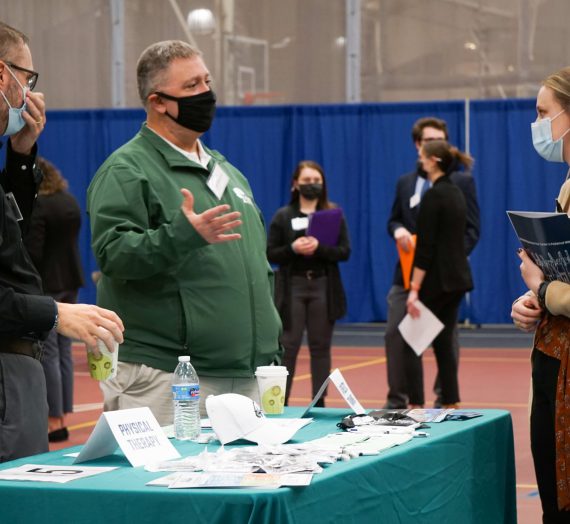Landing an interview after submitting dozens of applications (or more) is a huge accomplishment and should be a really exciting step in the job-search process! Every interview, successful or not, is a chance to improve on your interviewing skills, which will be relevant for your entire life.
Interviews are also the perfect opportunity to learn more about companies or organizations within your field, which gives you the chance to understand a little more about your chosen industry. It’s important to recognize that, even if it doesn’t lead you to a job right away, an interview is still a valuable experience in and of itself and could ultimately teach you something that helps you nail your next interview and get a job!
Preparation and lots of research is key for a successful interview experience. Keep reading for some of the most effective ways to get ready for your next big interview.
Study the company
Not every company cares if you know when they were founded or what their motto is, but it never hurts to know just in case. Even if the interviewer doesn’t explicitly ask you specific questions about the company, the more information you know, the more you can cater your interview answers to the company values and make yourself stand out as someone who aligns with the interests of the business.
If the interview is scheduled suddenly and you don’t have time to learn the intricacies of the business, you should at least do a quick internet search and learn the basics of what the company does, what kind of people they employ, and who their target audience is. This will give you a general idea of what their ideal candidate would look like. The more you know about who they are looking to hire, the better you will be able to see if you would be a good fit for the role. You can also use what you learn to your advantage by incorporating the information in your interview answers.
Have your friends test your skills
Not everyone is comfortable talking about themselves right away, and even those who do feel comfortable need to learn how to focus the conversation on the most relevant things that best fit the nature of the interview. The best way to do that is through consistent practice, out loud and with a friend.
You have likely seen or been asked many common interview questions that may come up in your next interview. It’s good practice to have an idea of what you’d say in response to these questions ahead of time so you’re not scrambling to come up answers on the fly during the interview.
Remember to include personal examples within your answers based on your experiences. Not only does this add credibility to your response, but it also gives the interviewer an idea of who you are as a person. This is important because the more human and personal you seem, the more memorable you become, and the more memorable you are, the higher the chances are of you getting hired.
Going over questions and answers in your head or typing out responses into an online document is helpful and a good starting place, but to get your answers to flow naturally, you have to practice saying them out loud. And having someone else with you is the best way to gauge how a genuine conversation would go and gives you an idea of whether or not you should add more detail to your response or make it a little more concise. Your practice partner will also be able to give you immediate feedback and let you know which responses were most effective and which could use some improvement.
Make sure you’ll be comfortable
A major component of confidence in an interview is how comfortable you are in the environment as well as in your outfit. If you are unprepared with either of these factors, it can add unnecessary stress and distract you from the interview.
Let’s start with the factor that’s easiest to control first: your choice of clothing. For an interview, you want to look and feel professional, but not at the cost of your personality or your comfort. Dress in a way that feels like an elevated version of your typical style. At the same time, your clothes shouldn’t distract from the task at hand. Heels, bulky and potentially noisy accessories such as rings, bracelets or watches, and tops with a tendency to slip off the shoulders could all get in the way of your ability to focus on the interview and avoid fidgeting with your clothing or accessories.
Ideally, you could go through the entire inview without having to worry or fidget with your wardrobe at all. Similarly, you want to avoid wearing anything that may put off the interviewer, including really strong cologne or perfume or anything unsuited for the work environment. Pro tip: if you have no idea how to dress for a specific interview, observe how current employees dress and take your cue from them, elevating their style of outfit by one level to stand out in the field.
Next up, make sure you’re comfortable in the environment of the interview. If the interview is on-site, take a trip to the business the day before (if you’re able) to get a feel of the place and understand the layout. This way on the day of the interview, you will know exactly where to go and what to expect. Even though this is something small, it’s still one less thing to worry about on the day of your interview, which will only increase your confidence.
If you are preparing for a virtual interview, take some time to become adjusted with the platform the host invited you to. You could schedule a call with a friend to make sure your audio and visual are working as well as to try out some of the features so you know exactly how the system operates.
These are really easy steps you can take that could have a big impact on your overall confidence and performance during the interview. The more familiar you feel with the software or company site, the more you will be able to concentrate on the interview itself, responding with international, well-thought answers.
Be yourself
Or more accurately, be the best version of yourself. It sounds cliché, but you really don’t want to get a job based on an interview where you felt removed from your true personality. If you do not see yourself aligning with a company’s core values or management system, it’s not worth squeezing yourself into their mold just for the sake of being hired.
It’s better to be rejected for staying true to yourself and your values than to be accepted for a position that will force you to abandon your principles in favor of their own. An interview should be an equal evaluation to see if you are a good fit for a specific role. You should be evaluating the company and their presentation of themselves just as much as they are evaluating you during the interview. From this perspective, it doesn’t make sense to change who you are or put up any false pretences during the meeting, because it may lead to a false evaluation and incorrect decision regarding whether or not you would fit the needs and values of the company.
So while it does benefit you to come to the interview well-prepared and researched, just remember that nothing about your responses should feel forced or empty. Job or no job, you want to be able to leave the interview feeling as though the employer got the chance to know all about the real experiences and accomplishments of you.




